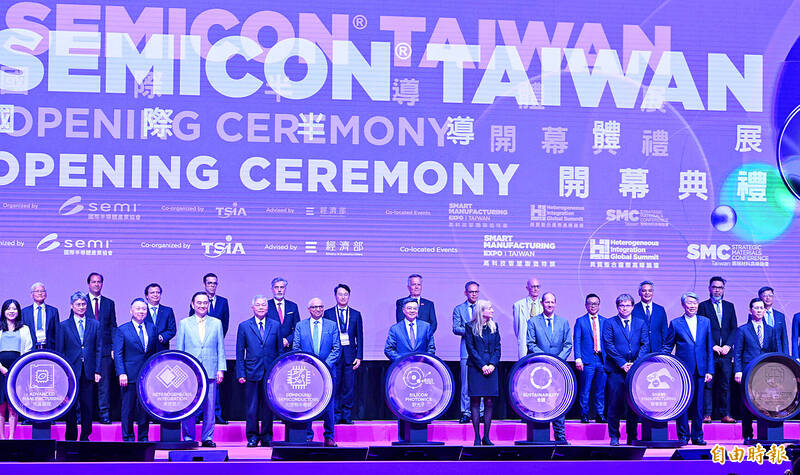《TAIPEI TIMES》 Taiwan driving global IC growth

Premier Cho Jung-tai, front row, center, and other guests pose for a photograph at the opening ceremony of Semicon Taiwan at the Taipei Nangang Exhibition Center yesterday. Photo: Chang Chia-ming, Taipei Times
‘MAJOR ROLE’: Taiwan Semiconductor Industry Association executive director Nicky Lu said that he expects a ‘golden age’ of at least 20 years for the IC industry
/ Staff writer, with CNA
Taiwan is expected to play a major role in driving global economic growth through its central position in the integrated circuit (IC) manufacturing sector, semiconductor industry leaders said in Taipei yesterday.
Speaking at the opening ceremony of Semicon Taiwan, SEMI president and chief executive Ajit Manocha said that the industry is “counting on Taiwan to play a big role” in artificial intelligence (AI) that would drive global economic growth.
“AI enabled growth is going to be more than 50 percent of the growth that we are in for next decade,” Manocha told an audience that included Premier Cho Jung-tai (卓榮泰), foreign delegations and SEMI top executives.
SEMI is a US-based association that promotes the global semiconductor industry.
The IC industry alone “ended last year at US$600 billion in revenue, and it took us 70 years to get there, but in the next seven to eight years, it will be US$1 trillion,” Manocha said.
After the next decade of quantum computing, the IC industry might reach US$4 trillion to US$5 trillion by 2050, he said, adding that “Taiwan plays a major role” in all of these high-tech areas.
Cho also spoke at the ceremony, highlighting “Taiwan’s responsibility” in the global industry.
“Taiwan and its people understand the responsibility we bear in global supply chains, and the Taiwanese government will shoulder the responsibility of making sure to improve the investment and production environments [in the nation],” Cho said.
Meanwhile, Manocha said he does not believe in the end of Moore’s Law, referring to the observation made in 1965 by Intel Corp cofounder Gordon Moore that the number of transistors in an integrated circuit doubles every two years, meaning chips get smaller.
“I think the way AI is coming into the picture, and the advanced packaging, the heterogeneous integration, the chiplets, all of which are only enhancing Moore’s law and the functionality of the chip,” Manocha said. “I think we will continue driving the growth of this industry, and all those activities are happening right here in Taiwan.”
Taiwan Semiconductor Industry Association executive director Nicky Lu (盧超群) echoed Manocha’s optimism, saying that he expects a “golden age” of at least 20 years for the IC industry as the Internet of Things sector continues to grow alongside the global rise of AI and quantum computing.
“Taiwan’s 2024 semiconductor revenue will reach US$160 billion again, more than 25 percent of worldwide revenue,” Lu said. “Mankind is setting up a global zero carbon emission target, demanding research and development breakthroughs, especially in semiconductors.”
To drive these innovations forward, “Taiwan has been working hard and in close collaboration with global partners effectively,” he said.
Lu cited Taiwan Semiconductor Manufacturing Co (台積電) -— which is building fabs in the US, Japan and Germany — as an example of Taiwanese companies expanding their operations overseas.
“ASE Technology Holding Co (日月光投控) is also investing in Malaysia, Mexico and the US, and GlobalWafers Co (環球晶圓) now runs 18 facilities in nine countries,” he said.
Mary Puma, chair of the SEMI international board of directors, said Semicon Taiwan underscores Taiwan’s pivotal role in semiconductor supply chains.
“Given its strategic importance, regional cooperation is becoming increasingly critical, and the exhibition will deepen cross-border exchanges, foster innovation and strengthen partnerships,” she said.
The three-day semiconductor expo runs until tomorrow at the Taipei Nangang Exhibition Center.
新聞來源:TAIPEI TIMES




















